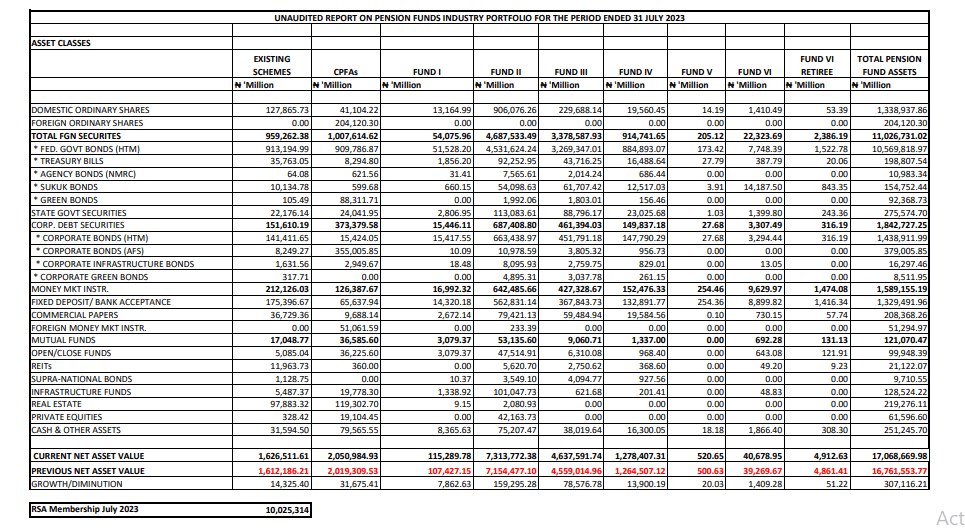Due to the decline in the value of the Naira, the dollar value of the pension funds fell by 45.18%.
According to data from the National Pensions Commission website, the net asset value of pension funds in September was $17.35 trillion, which equates to $19.83 billion when converted to $874.71 , Wednesday’s official exchange rate.

But before the devaluation of the naira in mid-June, the Central Bank of Nigeria tried to unify the country’s exchange rates. The value of pension funds in June was N16.76 trillion, equivalent to N36.17 billion at the June 9 exchange rate of 463.38/$.
In a memorandum signed by its director, Financial Markets, Angela Sere-Ejembi, on June 14, 2023, the apex bank announced the collapse of the foreign exchange segment during the Investor and Export Window (later renamed the Nigeria Decision Window). Autonomous exchange rate. Since harmonization, the local currency has struggled against the dollar, despite government efforts to strengthen it.
To boost investor confidence, the CBN has this month started offsetting banks’ foreign exchange balances. The exchange rate harmonization was a follow-up to President Bola Tinubu’s inauguration speech where he urged the CBN to harmonize the country’s exchange rate.
The domestic inflation rate, which rose from 22.79% in June to 26.72% in September, also reduced the value of pension funds. Speaking to The PUNCH, Abdulkadir Dahiru, Head of Corporate Communications at PenCom, said Nigeria’s devaluation has not only affected pension funds but the economy at large.
Commenting on the work the Commission has done to prepare for microeconomic headwinds, he said: “The depreciation of the naira has not only affected pension funds. It affects everyone and it’s a two way problem. There is inflation and there is devaluation.
“So anyone with money in the bank can see how inflation has affected their money. “The value of a currency falls because more currency is needed to buy the same amount of goods and services.”
According to Dahiru, the advantage is that pension funds invest in so many products.
“We have fixed income products and variable income products. Variable income products are products with indeterminate prices because the price is determined by supply and demand each time they enter the market. However, when you invest in stocks, the price you pay for those stocks will rise or fall based on market forces.
“Investment returns on variable income products are adjusted for inflation. Because PFAs invest in securities, alternative investment assets such as infrastructure funds and private equity funds such as real estate investment trusts, the portfolio includes some investments to cover inflation,” he explained. . Pension funds are one of the biggest players in the Nigerian capital market.
It attracted international attention in October following a visit by US institutional investors, who called for expanded regulation to increase market participation by pension fund managers.
Speaking at the Nigeria Exchange Limited, Cameron Khosrowshahi, Group Head of Investments at Prosper Africa, said US institutional investors are willing to work with Nigerian institutional investors, including pension funds, to explore more investment opportunities in the economy
“Stakeholders in Nigeria must work with the pension regulators to enable pension funds to inject more liquidity into the Nigerian stock market,” Khossroshahi urged.
Read Also: “I ‘Will Contest Again In 2027”-Peter Obi at World Press Conference
